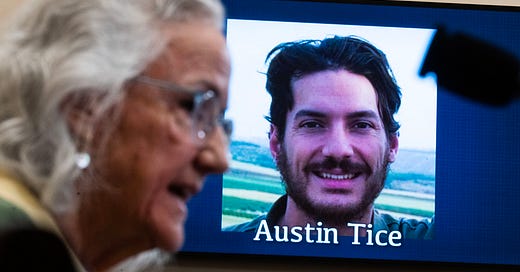The Search for Austin Tice Goes Beyond Syria
The U.S. is investigating claims that missing journalist Austin Tice may have been moved at some point before Assad's overthrow.

The stunning collapse of Bashar al-Assad’s regime in Syria has reopened questions about the fate of missing American journalist and former marine Austin Tice. Tice disappeared during the early days of the country’s uprising in 2012 after reportedly being detained by Syrian government forces on accusations of espionage. Since then, despite periodic attempts by U.S. officials to negotiate his release and at least one escape attempt by Tice in 2013, his fate has remained a mystery.
The opening of the country’s prisons and the release of thousands of former detainees of the Assad government in December raised hopes that Tice would be located. To date, no trace of him has emerged.
According to U.S. officials who spoke to Drop Site on background, the U.S. government is now considering sending law enforcement teams to Syria to investigate what they described as secret prisons where Tice may have been held in the custody of the former government. U.S. officials also said they have not ruled out the possibility that Tice may have been transferred out of Syria to a third country at some point prior to the collapse of the regime in December.
U.S. officials have been investigating claims that he was transferred to a country that had relations with the former Syrian regime, including Iraq or Iran. In parallel, there are ongoing efforts to find evidence of Tice inside Syria. A delegation of officials from the Biden administration visited Syria in December to meet with the new government and continue the search for Tice.
“Since I went to Damascus on December 20, we have received a lot of information from people on the ground and elsewhere about where Austin Tice may have been held,” Roger Carstens, the Special Presidential Envoy for Hostage Affairs told Drop Site. “We hope to get a forensic team on the ground to those sites soon to gather evidence – DNA samples, paper records, and other things – and find out what happened to Austin.”
The possibility that Tice may have been covertly moved out of Syria to another third country echoes claims made by a number of former Assad era security officials, including a former Syrian brigadier-general who gave an interview earlier this month to Al Jazeera Mubasher, and two former Syrian intelligence officials who spoke to Drop Site. None of them had direct evidence of Tice’s transfer out of the country, or present whereabouts. Instead, their claims are based on personal knowledge of the decision-making process of senior Syrian officials, as well as their assessment that the government considered Tice to be an important political asset to win concessions from the U.S. in future negotiations.
Tice, who was captured at the age of 31, has been missing for over a decade. A native of Houston, he served in the U.S. Marine Corps and did a tour in Afghanistan before attending Georgetown Law School. In 2012, while on summer break from his studies, he traveled to Syria to work as a freelance journalist. He covered the early period of the country’s uprising, filing stories for a number of U.S. publications and winning a prestigious George Polk Award for his dispatches.
In August of that year, Tice was detained at a checkpoint outside Damascus. A video later circulated on social media showing him blindfolded and surrounded by a group of armed men. That video was the last visual evidence of Tice seen by the outside world. Despite initial fears that he had been kidnapped by Islamic extremists, in the intervening years, the U.S. government has repeatedly said that it believed that Tice was both alive and in the custody of the Assad government.
Earlier this month, in an interview with Al Jazeera Mubasher’s Alaeddin Al-Yousuf, Safwan Habib Bahloul, a former Assad regime military official, provided details on what he said were his own interactions with Tice during his detention. Bahloul also said he believed that the detained American had possibly been secreted out of Syria by the Assad government to a friendly third country at some point prior to Assad’s fall.
Bahloul, a brigadier-general who served as head of a branch of Syria’s military intelligence apparatus, is from the same Alawite sect as the Assad family. Al Jazeera’s interview with Bahloul, during which he discussed not only Tice, but also crimes committed by the Assad regime, has since been removed from the channel’s website, reportedly following an outpouring of threats against Bahloul.
Bahloul’s assessment that Tice may have been transferred out of Syria was shared by two other former members of Syrian intelligence who spoke to Drop Site. After allegedly being detained by a pro-Assad militia, subsequent reports suggested that Tice was transferred between the custody of different branches of the country’s security services in the ensuing years.
A former officer in Syria’s notorious Air Force Intelligence department told Drop Site that Tice could have been moved to a third country to be used as a bargaining chip by former officials. This assessment was echoed by a former Syrian military intelligence officer who told Drop Site he believed that Tice remained under the control of former regime officials or their allies, citing the possibility that he had been transferred into the custody of pro-Iranian Shia militia groups in Iraq—some of which are believed to be holding other Western hostages—or may even have been taken by senior regime officials to Russia when they fled the country, though the latter possibility is not currently viewed by U.S. officials as credible.
As the Assad regime collapsed, U.S. government officials made fresh statements indicating that they believed that he was still alive. “The assumption we’re working under is that he’s still alive,” said White House national security communications adviser John Kirby. “But the truth is we want to get more information about him, about his whereabouts, certainly about the conditions in which he may be held.” At a press conference on January 16, Secretary of State Antony Blinken added that the government was still searching for information about his fate, “leaving no stone unturned.”
In December Tice’s mother wrote a letter to Russian president Vladimir Putin asking for assistance locating her son, stating that she would, “be willing to travel to Moscow or any other place on earth" to reunite with him. At a public press conference that month, Russian President Vladimir Putin said that he would inquire about Tice’s fate and whereabouts. Tice’s family did not respond to a request for comment for this story.
A number of other scenarios remain possible, including that Tice may still be in the custody of senior regime officials hiding in Syria. This prospect was recently raised by the head of the U.S.-based NGO Hostage Aid Worldwide, who said on Tuesday that he believed that Tice was still in Syria under control of individuals tied to the former regime.
News reports in the days after the collapse of the government also raised the possibility that Tice could have been killed in a massive campaign of Israeli airstrikes against former regime security targets as the Assad government collapsed. Amid the strikes, Tice’s mother wrote a letter to Israeli prime minister Benjamin Netanyahu asking him to pause the attacks to allow rescuers to reach a site near Damascus where the family had “credible information” that Tice might be present.
Bahloul’s comments about interrogating Tice in detention are consequential as the Syrian government previously denied that Tice was even in their custody, stating in 2022 that it “denies it had kidnapped or is holding any American citizen on its territories.” Despite that claim, according to later reports, the Assad regime had privately demanded the withdrawal of U.S. forces and other concessions as a prerequisite for any negotiation over the disappeared American.
In the since-deleted Al Jazeera interview, Bahloul said that after Tice’s arrest he was contacted by General Bassam Al-Hassan, a senior security advisor to Assad, who informed him that a U.S. citizen identifying himself as a journalist had been detained in Syria. According to Bahloul, Syrian authorities suspected Tice of conducting espionage in the country on behalf of the U.S. government, in part due to his possession of a satellite broadcasting device.
Bahloul said that he interrogated Tice numerous times at a facility in the Mezzeh area of Damascus. Bahloul said that Syrian authorities continued to believe that Tice was working covertly for the U.S. military or intelligence services despite the fact that he was no longer in the military. “The intense interest from the American press and high officials showed that this man has special importance and there was great likelihood that he is an officer.” Bahloul also denied that Tice was tortured during his interrogations, as was common in Syrian prisons.
In 2013, Tice attempted to escape from prison. According to a Reuters report, after fleeing the custody of forces loyal to the Syrian government, a bedraggled Tice was found wandering the upscale neighborhood near the prison in Damascus, before entering the house of a Syrian family in the area to seek assistance. Tice was then reportedly recaptured by Syrian government forces .
According to Bahloul, that escape attempt came after Tice had asked for a bar of soap and a towel in exchange for further cooperation. Tice, Bahloul said, later applied the soap to his body to make it easier for him to squeeze out of the tight prison cell window and used the towel to cover the shards of broken glass planted on the edges of the window to deter escape. Bahloul said he met Tice in custody once more shortly after this thwarted escape attempt, and indicated in his interview that he believed he was still alive.
In 2018, the FBI announced a $1 million reward for information about his fate, as U.S. officials continued to publicly indicate that they believed he was alive and in the custody of the Assad regime. In 2020, former counterterrorism official (and now Donald Trump’s nominee for FBI Director) Kash Patel went to Damascus as part of an effort to negotiate the freedom of Tice and another detained American, Majd Kamalmaz, on behalf of the first Trump administration.
At a press conference after the fall of the Assad regime last month, outgoing President Joe Biden addressed the issue of Tice and other disappeared Americans. "We are mindful that there are Americans in Syria," Biden said, "including those who reside there, as well as Austin Tice, who was taken captive more than 12 years ago,” adding that the U.S. remained, "committed to returning him to his family."
In his remarks Biden added that the U.S. government assessed that Tice was still alive. "We think we can get him back, but we have no direct evidence of that yet,” he said, adding, "We have to identify where he is."







Journalists pay a heavy price for simply reporting the news. Thank you for raising your voices for us.